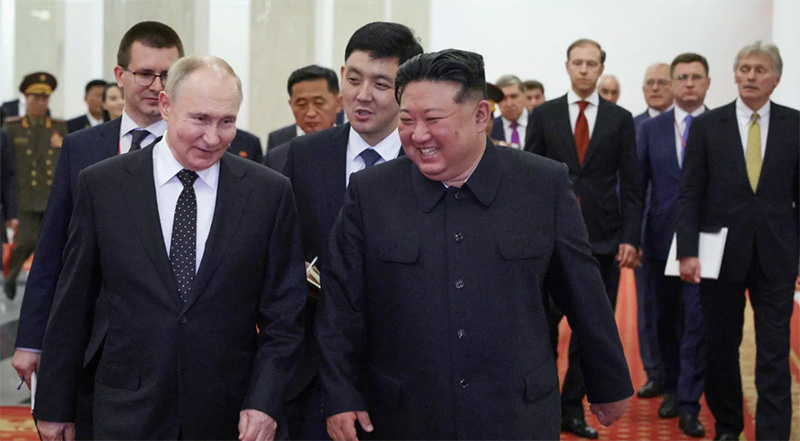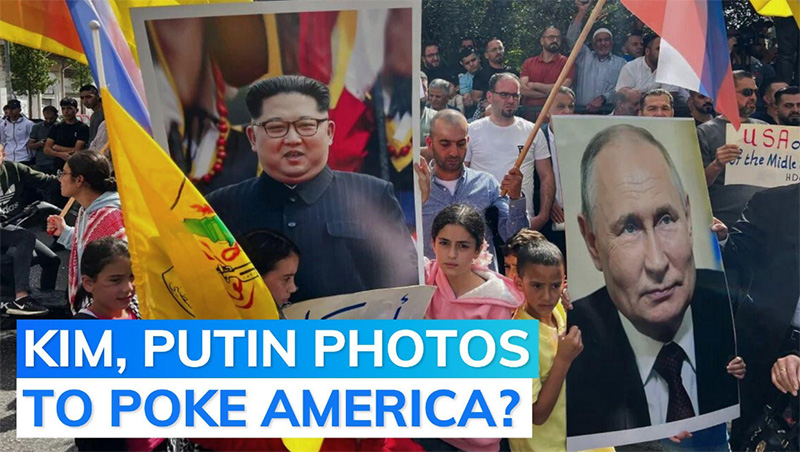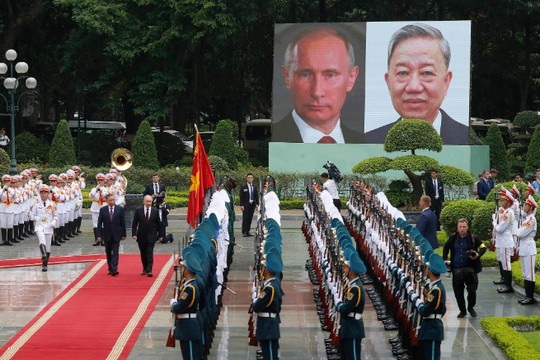Vietnamese President To Lam, left on red carpet, and his Russian President Vladimir Putin, right on red carpet, review the guard of honor at the Presidential Palace in Hanoi, Vietnam, on June 20.
Photo: AP
Russian President Vladimir Putin said he wanted to build a "reliable security architecture" in the Asia-Pacific region during a state visit to Vietnam on Thursday, part of a trip to Asia seen as show of defiance to the West, notes Reuters.
Putin had contributed to "peace, stability and development" in the world, Vietnam's president said.
Putin's visit has drawn criticism from the United States and its allies, who treat the Russian leader as a pariah and have protested that he should not be given a stage on which to defend Russia's war in Ukraine.
Russia and Vietnam signed agreements on issues including energy, underlining Moscow's pivot to Asia after the West imposed sanctions on Moscow over the conflict in Ukraine.
At a news conference to wrap up his trip, Putin accused the NATO military alliance of creating a security threat for Russia in Asia, TASS reported.
The military ceremony put on to greet Putin, who was embraced by both Vietnamese President To Lam and Prime Minister Pham Minh Chinh, was the kind reserved for the highest heads of state.
The two presidents witnessed the exchange of 11 agreements and memorandums of understanding, including deals on oil and gas, nuclear science and education.
At another event, Lam said Putin continued to lead Russia "overcoming all difficulties and challenges, at the same time contributing to the peace, stability and development in the region and the world."
Abuza underlined Vietnam and Russia's shared Communist history, with tens of thousands of Vietnamese cadres – including current members of the Politburo – having trained in the former Soviet Union.
Vietnam's hosting of Putin was criticised by the EU and by the United States, now an important partner which upgraded diplomatic relations with Hanoi last year and is Vietnam's top export market.
The U.S. State Department said a top U.S. diplomat will visit Vietnam this week to stress Washington's commitment to working with it to ensure a free and open Indo-Pacific.
 Vladimir Putin and Kim Jong Un.
Vladimir Putin and Kim Jong Un.
Photo: Sputnik
The Comprehensive Partnership Treaty between Russia and North Korea hammered another nail into the coffin of the collapsing world order, doubled the anxiety of the Western powers, and increased their confusion. With this treaty, the path of the idea of multipolarity began to become clear, which is strengthening day after day, and is almost becoming a historical inevitability that mocks those who drag it backwards, writes Al Khaleej from UAE.
After months of speculation, hypotheses, and calculations, Russian President Vladimir Putin made an official visit to North Korea, and held, with its leader, Kim Jong Un, a summit that Pyongyang had never witnessed in its modern history, in terms of its contents, goals, and strategic dimensions, and it is in the global context. The current situation cannot be underestimated or underestimated, in addition to its effects on the tense relationship between the two countries and the Western powers. This treaty is an unparalleled gain for Pyongyang, which is subject to chronic US sanctions, lives in permanent isolation, and wants to be a significant player in its region with direct support from China and an almost completed alliance with Russia.
After the signing, Kim Jong Un said, “Times have changed. The position of North Korea and Russia in the structure of global geopolitics has also changed,” while Putin pointed out that one of the provisions of the treaty stipulates the provision of assistance in the event that one of its parties is exposed to aggression.
This clause is perhaps the most disturbing to the United States and its allies, and a direct and highly significant response to the efforts of Western powers to provide Ukraine with long-range, high-precision weapons systems, F-16 fighters, and other similar weapons and equipment to launch strikes on Russian territory. The Russian President had previously warned of the consequences of this step, and hinted several times at arming anti-Western international parties to target the interests of his countries.
Many observers commented on this gesture, considering it an expression of Russian impatience, and implementing this step will make the armies of several countries, including North Korea, more lethal and capable of confronting Western policies, and will accelerate the undermining of the foundations of its dominance over the world since the end of World War II.
From this perspective, Putin's visit to North Korea is nothing more than an invasion of a major war currently taking place to form a New World Order, a geopolitical reaction with far-reaching repercussions, and an introduction to mapping effective alliances, in preparation for the expected resolution.
In its coverage of Putin's visit to Pyongyang, the Western media did not abandon its sense of superiority and described the two countries, Russia and North Korea, as ‘isolated countries’ and subject to unilateral sanctions from the United States and its allies, but Putin and Kim showed a disregard for these sanctions, which became exciting.
For ridicule, it has returned disastrously to those who imposed it, with historic bankruptcy, an unprecedented rise in debt rates, and the violent political earthquakes it caused in Europe, such as the rise of the extreme right. In the absence of recognition that global reality is changing, the risks will continue, and the West will ultimately find itself isolated.
It is illogical for Russia, the decisive power in international politics since the Middle Ages, to be on the margins of the world, along with China and almost all developing countries that are efficiently rebelling against the new and old colonial powers, all of whom also want a more secure, stable, and just world among their nations. And its peoples, and not subject to an international system that was not originally liberated from the complex of masters and slaves.
The Russian president, Vladimir Putin, took the North Korean leader, Kim Jong-un, for a ride in an Aurus, a Russian-made luxury limousine. Footage released by Russian state TV showed the two leaders driving around what appeared to be a park in Pyongyang before they switched places and Kim took the driver's seat.
Russia and North Korea revived a deal struck during the Cold War when their leaders met in Pyongyang this week and agreed to come to each other’s defense if they are ever attacked. How it will be actually implemented is still a question, but the pact sets Russia and North Korea on a path that keeps them in lockstep as they try to vex the US and its partners, writes Bloomberg.
They agreed to immediately provide “military and other assistance” if either of them is attacked. Dubbed the Treaty on the Comprehensive Strategic Partnership, it is similar to a 1961 deal signed during the Cold War which was scrapped after the collapse of the Soviet Union. The level of assistance the two sides will provide each other is unclear. Putin and Kim also agreed to take joint measures to strengthen their defense capabilities and expand cooperation in trade and investment — all of which could be in violation of international sanctions. The treaty will be effective indefinitely until either of them seeks its expiration.
Kim gets an ally with a nuclear arsenal to back him up. It also means he can continue to pursue his own atomic ambitions with Russia using its veto power at the United Nations Security Council to block any new sanctions. Putin said the treaty sets the stage for boosting their cooperation in trade, investment as well as in security matters for the long term, all of which are what North Korea wants. Kim needs cash, commodities and technology to help with his plans to build a nuclear-powered submarine and deploy an array of spy satellites. North Korea’s economy was estimated by South Korea’s central bank to have been worth about $24.5 billion in 2022, and any assistance makes a big difference. Russia has so far provided North Korea with food, raw materials and parts used in weapons manufacturing, South Korean Defense Minister Shin Wonsik has said. If the arms transfers grow, Russia will likely send more military technology, increasing Pyongyang’s threat to the region, Shin said.
The US has to recalculate what might happen if it uses weapons against North Korea. An option discussed during the Trump administration was a “bloody nose” strike on North Korea designed to hit a key facility or two and remind Kim that his antiquated military is no match for America’s might. The deal means the US has to plan for the contingency of a Russian response. The pact also makes it easier for Kim to ignore Washington’s call to return to nuclear talks, where aid is offered in exchange for him winding down his atomic arsenal.
 Hamas-Israel war: West Bank protesters display pictures of Putin & Kim Jong Un.
Hamas-Israel war: West Bank protesters display pictures of Putin & Kim Jong Un.
Chinese analysts said it is a "rational choice" for Moscow and Pyongyang to move closer, as the long-standing strategy of the US and its allies to isolate and suppress the two countries will automatically push them to work together to deal with the common threat from US-led alliances, whether in Europe or Northeast Asia, writes ‘The Global Times’ from China.
Russia-North Korea cooperation will surely add to the headaches of decision makers in the White House, experts noted.
Moscow will continue to support Pyongyang in its fight for independence, and will together build the security architecture in Eurasia, counter Western sanctions and establish independent transaction systems, Putin said in an article for the Rodong Sinmun newspaper on the eve of his state visit to the Democratic People's Republic of Korea (DPRK).
Putin wrote that Washington keeps setting obviously unacceptable requirements, while North Korea has repeatedly expressed its intention to resolve all existing differences by peaceful means.
Wang Junsheng, a research fellow of East Asian studies at the Chinese Academy of Social Sciences in Beijing, told the Global Times that this visit is sure to bring Russia-North Korea relations to new heights.
Due to NATO's expansion in Europe and the ongoing Russia-Ukraine conflict, and the US-led military alliances in Northeast Asia targeting Pyongyang, the deeper cooperation between Russia and North Korea is no surprise, Wang noted.
Cui Heng, a research fellow from the Center for Russian Studies of East China Normal University, told the Global Times that "it is a rational choice" for Moscow and Pyongyang to cooperate, and any significant cooperation between Russia and North Korea could make the US concerned or even frightened. This means Washington's approach in past decades has failed to weaken and isolate these two countries, as they are now standing closer with each other and becoming more powerful than before through cooperation, Cui added.
Russia and North Korea are both important neighbors of China, and the three countries share interests in safeguarding regional peace and stability and oppose bloc confrontation and hegemony, Chinese analysts said.
Lin Jian, a spokesperson of the Chinese Foreign Ministry, said at a routine press conference in response to a question about the Russian president's visit to North Korea that "China welcomes Russia to cement and grow ties with countries they have traditional friendship with."
US decision-makers should realize that Washington cannot dictate everything or force others to accept US hegemonic values of right and wrong, and the more it tries to interfere in other countries, the more weaknesses it exposes to the world, analysts said.
read more in our Telegram-channel https://t.me/The_International_Affairs

 11:48 22.06.2024 •
11:48 22.06.2024 •























